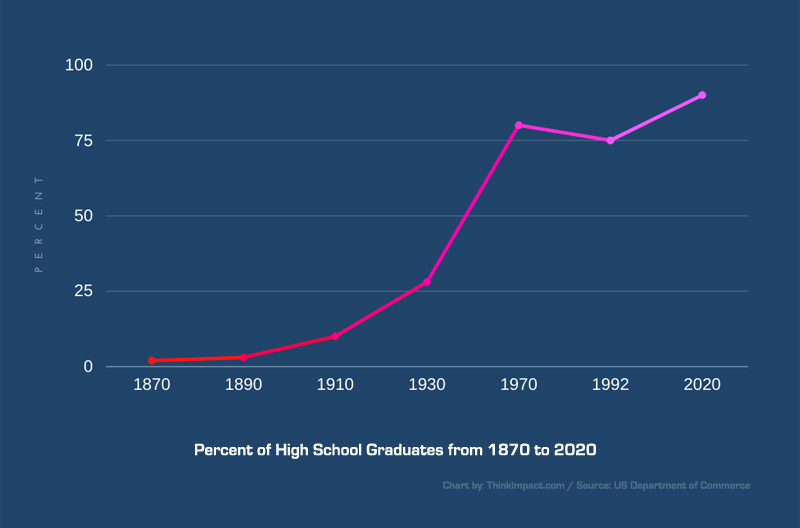Dropping Out of School
In a four-year college, an average of 65% of all students drop out within 6 years. In 2019, a study showed that less than half of Americans between the ages of 25 and 35 had no school credit past a high school diploma. Even then, there are plenty of Americans who don’t even make it that far. In fact, over 1.2 million high school students (just in America alone) drop out yearly. The rates are so high, that there must be some reasonable explanation as to why. And if we understand the reasoning, maybe there’s something that can be done about it.
There are many reasons for people dropping out of school. Sometimes it’s personal issues. These are kind of unavoidable and there’s nothing schools can change to help them. Personal issues include: getting pregnant, getting arrested, or having to work to support their family. Some students also drop out because they start hanging out with the wrong people. It’s hard for one to care about school if everyone around them doesn’t care about it. These are often problems that occur in high school.
Sometimes high school students get burned out, especially if the classes students are taking are too low of a level for them. A lot of students reported saying that their classes weren’t engaging enough; they were bored and unmotivated. The problem is not that their classes are too hard, or they don’t understand them, the problem is that they’re placed in classes that are too easy for them. There’s no reward in doing something that has no challenge, classes just start feeling like an unnecessary burden.
Another major factor that can cause students to drop out is that some students struggle in a school environment. They fall behind because they can’t focus or they don’t understand the material and just can’t complete their work. Eventually, they might fall so far behind that they can’t catch back up. The initial failure can be a huge discouragement alone and if the situation doesn’t improve they might just lose the mental strength to keep going.
For college, along with some of the previously mentioned struggles, there are some extra factors that are involved that cause them to drop out. One major deterrent to college is money. College costs a lot of money, in fact, the average American spends around $35,331 a year on college alone. Not everyone can afford to lose that much money or get too overwhelmed with the cost. College is difficult as it is and can be described as soul-crushing on its own, financial issues just make the whole situation worse.
Most people who dropped out of school blame themselves for it. They end up saying they could’ve graduated if they had really tried. However, for high school students, shouldn’t some of the blame fall on the shoulders of the parents and school themselves? High school’s jobs are to give their students the resources they need to succeed and learn. If students aren’t finding that in their high school, the problem is not the students, it’s the high school itself. Another important thing to note with high school students that drop out is that most of them have parents that didn’t care about their attendance or grades. This is just another reason schools should be more on top of it when it comes to struggling students.
So what can be done to help students make it through school without feeling the need to drop out? Despite the fact that not every student’s struggle can be easily solved, there are a few things that can be done by schools themselves to help lower the number of students that drop out.
For example, hiring teachers that are effective and well-liked by students. If a large majority of students skip, dislike, fail, or lack participation in a class, it might be by fault of the teacher. Not that a teacher should be fired immediately if such a thing happens, but students should have more say in who their teachers are. Schools should at least make it easier and more accessible for students to change teachers if they wish.
Schools could also send out more surveys for students to fill out (not multiple-choice ones that are looking for specific answers, but open-ended ones where students can put their true opinions on matters they think are important) regarding what they need to succeed, how they feel about the school, and how they feel about teachers. This would also mean that schools would need to be alert about the students’ answers and follow up on them; make sure the feedback is taken into consideration and effect.
Another possibility might be longer breaks in between classes. It would make school longer, but working for six straight hours without break is overwhelming and tiring. A lot of students need small breaks in between to let their brains rest and reset. Time between classes in Skyline High School is 5 minutes, adding 5 more minutes between classes (for a total of a ten-minute break) would only add on half an hour more time onto school. If schools were to try this and it was effective in helping students be more productive, then that would be a very minor repercussion.
Probably the most effective way for schools to improve is to give the students someone to talk to that they trust and who cares, be it a teacher or counselor. It should be something that is encouraged openly and often in school. The school should have someone that can help educate students struggling on why they’re struggling and work with them to improve the issues. Even calling students down to talk to them if they’ve had an “F” in a class for a while would probably be a great idea. Failure can be a cry for help that a student is too afraid to verbalize. Again, not every student has encouragement at home and when someone gets in a slump, it can be hard to get back out. Students who are struggling sometimes only need support and, at least high schools, should supply it.
A lot of these procedures may seem extremely difficult or unnecessary to some people, but schools don’t necessarily need to spend a ton of money or change every single detail of how they run to help students succeed. One small change could go a long way, the right change just needs to be made.

I am a senior at Skyline High School, born in Mississippi and raised in Idaho Falls. Despite constantly jumping from one obsession to the next, writing,...








